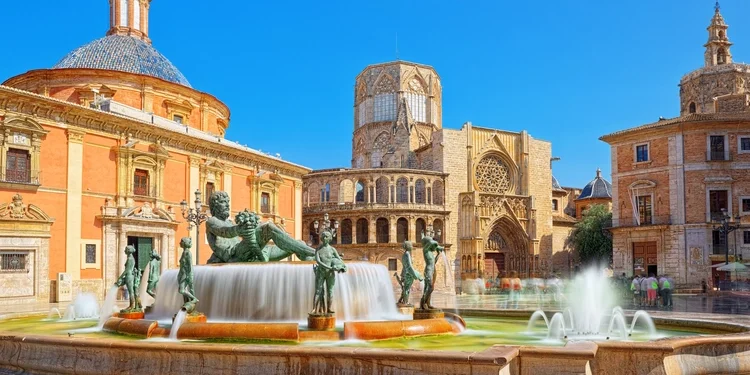Drumroll, please…
Announcing, the Best Place To Retire In Europe (And The World) for 2024: Valencia, Spain!
City of Joy… City of Oranges… City of Arts and Sciences… World Capital of Design… European Capital of Smart Tourism… Green Capital of the Future… Gastronomic Mecca…
Despite not being well known to North American audiences, Valencia has innumerable accolades, awards, and claims to fame.
I’ve been touting Valencia for months now, and it was the horse I backed unquestioningly for this year’s competitive Overseas Retirement Index, so seeing it sweep the rankings for 2024—despite this being the first year we’ve ever included a Spanish destination—was a satisfying result.
Retirement in Spain has historically called to mind giant 70’s-era condo towers stacked on crowded beaches, filled with mostly British expats who tend to create “Little Britains” in their new neighborhoods overseas. So many of the most famous southern costas have been flooded with cheap, ugly construction and drained of any authentic or historic charm.
Valencia is a stand-out exception to this rule.
It’s in the sweet spot about midway between the rugged and little-visited Costa Azahar (“Orange Blossom Coast”) to the north and the expat-popular Costa Blanca to the south.
The Costa Blanca offers a wealth of golf courses, spas, and other planned amenities that attract foreigners… Valencia is within an hour of those amenities but also distinctly separate from them.
Valencia is the capital of its eponymous region, but with a mere 800,000 or so residents, it’s a small, manageable city that doesn’t feel crowded or overwhelming. The feeling here is laid back.
Located on Spain’s eastern coast, on the floodplain of the Turia River as it empties into the Mediterranean Sea, the earth here is famously fertile. The surrounding countryside is abundant with crops—its world-famous citrus, of course, as well as apples, pears, apricots, peaches, cherries, plums, pomegranates, almonds, lettuce, cauliflower, tomatoes, onion, peppers, artichoke, melons, beans, and more.
Locals tend to think of Valencia as a river city, though it hasn’t been on the banks of the Turia since it was diverted in 1969 due to flood concerns. The former river bed has been turned into a park that snakes through the city, called the Gardens of Turia—Valencia is ever the innovative city.
Start Your New Life Today, Overseas
As well as a city-wide park, the gardens also provide space and parkland for the magnificent City of Arts and Sciences, a stunning series of architectural works by world-renowned architect Santiago Calatrava (a beloved native son of Valencia) housing the city’s world-famous museums and aquarium (the largest in Europe). These buildings have been used as sets for futuristic sci-fi films and TV series, including “Tomorrowland” and “Westworld”.
Keeping busy and active will never be a concern here, with every possible type of cultural entertainment on offer, including over 40 museums, plus galleries, archeological sites, regular music and dance performances, monuments spanning from medieval to modern, as well as shopping, bars, and restaurants galore—nearly all of which offer year-round al fresco dining.
And with the Mediterranean 30 minutes from the city center and mountains for hiking or skiing about an hour away, in addition to the abundant green spaces throughout the city, you’ll never go wanting for outdoor recreation either.
Perhaps the most alluring aspect of Valencia for many is its temperate climate. This region boasts one of the mildest winters in Europe, with January temperatures comparing with May and September climates in other major Western European cities.
This is due partially to its Mediterranean location and in part to the ponentà, the local name for the phenomenon that shields the city from rain and warms the region up to 25°F more than without its effects. Humidity is consistently between 60% and 65%, never more, and the region gets about 2,700 hours of sunshine—300+ days—per year.
To get from one side of the city to another, or to the beaches, residents avail of its top-notch public transportation, with metro, buses, and trams taking you across the city in minutes. But because the weather is always so pleasant, most folks prefer to walk or bike, and because the city is small, well-paved, and flat, this is an easy, enjoyable prospect.
Developments and initiatives are planned far into the future, mostly focusing on renaturing, reducing its carbon footprint, and enlarging pedestrian zones.
Infrastructure here is consistently good, with reliable electricity and fast internet that has made it a haven for remote workers who take advantage of Spain’s digital nomad visa.
And the health care is some of the best in the world, with Spain ranked as having the 7th-best system in the world according to the World Health Report. Several of Valencia’s hospitals regularly top the charts of rankings of the best hospitals in Spain, and clinics, pharmacies, dentists, veterinarians, and other medical facilities are plentiful.
One of the biggest misconceptions North Americans have is that life in Europe is financially out of reach, but Spain is known for being the most affordable region in Western Europe.
Even Valencia, a culturally rich, historic city with high-level infrastructure and a high quality of life, is affordable by most people’s standards.
Plus, dollar-holders enjoy a currency discount, with the euro down about 10% relative to the dollar over the past two years and about 20% lower than long-term trends.
While Valencia is no stranger to expats, with more discovering this fantastic city every year, it isn’t dominated by foreigners as many other coasts can be in Spain. You’ll have no trouble making friends who speak English, but to really enjoy your new life here, you’ll need to speak Spanish.
Visiting tourist sites and eating at the café next door to them might deceive you into thinking you can get by in English here, but those places make a business of catering to foreigners. You’ll find that most waiters or service staff don’t speak English outside of these scenarios.
Luckily, Spanish is one of the easier languages to learn, and many Americans have some foundation of it already. Start learning in advance of your arrival, and you’ll fit right in.
When it comes to choosing a retirement overseas… or a new home in Spain… it’s hard to imagine a better lifestyle than that offered by Valencia…
Bonne route,

Kat Kalashian
Editor, In Focus: Europe










